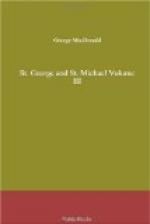Never until now had he felt enmity in space: it had been hitherto rather as a bridge to bear him to Dorothy than a gulf to divide him from her presence; but now, through the interpenetrative power of feeling, their alienation had affected all around as well as within him, and space appeared as a solid enemy, and darkness as an unfriendly enchantress, each doing what it could to separate betwixt him and the being to whom his soul was drawn as—no, there was no as for such drawing. No opposition of mere circumstances could have created the feeling; it was the sense of an inward separation taking form outwardly. For Richard was now but too well convinced that he had no power of persuasion equal to the task of making Dorothy see things as he saw them. The dividing influence of imperfect opposing goods is potent as that of warring good and evil, with this important difference, that the former is but for a season, and will one day bind as strongly as it parted, while the latter is essential, absolute, impassible, eternal.
To Dorothy, Richard seemed guilty of overweening arrogance and its attendant, presumption; she could not see the form ethereal to which he bowed. To Richard, Dorothy appeared the dupe of superstition; he could not see the god that dwelt within the idol. To Dorothy, Richard seemed to be one who gave the holy name of truth to nothing but the offspring of his own vain fancy. To Richard, Dorothy appeared one who so little loved the truth that she was ready to accept anything presented to her as such, by those who themselves loved the word more than the spirit, and the chrysalis of safety better than the wings of power. But it is only for a time that any good can to the good appear evil, and at this very moment, Nature, who in her blindness is stronger to bind than the farthest-seeing intellect to loose, was urging him into her presence; and the heart of Dorothy, notwithstanding her initiative in the separation, was leaning as lovingly, as sadly after the youth she had left alone with the defaced sun-dial, the symbol of Time’s weariness. Had they, however, been permitted to meet as they would, the natural result of ever-renewed dissension would have been a thorough separation in heart, no heavenly twilights of loneliness giving time for the love which grows like the grass to recover from the scorching heat of intellectual jar and friction.
The waning moon at length peered warily from behind a bank of cloud, and her dim light melting through the darkness filled the night with a dream of the day. Richard was no more of a poet or dreamer of dreams than is any honest youth so long as love holds the bandage of custom away from his eyes. The poets are they who all their life long contrive to see over or through the bandage; but they would, I doubt, have but few readers, had not nature decreed that all youths and maidens shall, for a period, be it long or short, become aware that they too are of the race of the singers—shall, in the journey




